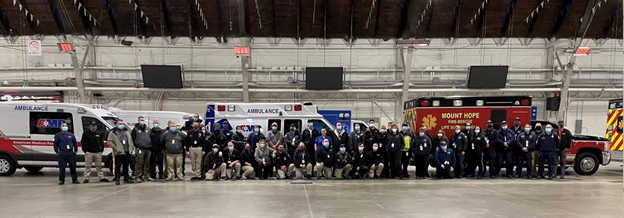We’re Assisting East Coast Communities Hit Hard by COVID-19
12.20.2021
Our ground division, AMR, and sub-contracted network providers are responding to requests for aid from the Federal Government in New York, Vermont and New Hampshire.
GMR’s National Command Center (NATCOM), which houses its Office of Emergency Management, has been activated to support COVID deployments nonstop since late January 2020.
COVID-19 continues to overwhelm hospitals and EMS agencies across the country, and Global Medical Response (GMR) is deploying paramedics, EMTs and support personnel to provide much-needed help in New York, Vermont and New Hampshire. GMR is sending more than 120 paramedics, EMTs and Incident Management Team members, along with ambulances from its ground division – American Medical Response (AMR) – in addition to teams from participating network providers to the hard-hit east coast states. The deployments are in response to a FEMA request to help the federal government and local emergency personnel respond to record surges in COVID-19 infections and hospitalizations.
“We began our COVID deployments in late January 2020 and have provided much-needed aid to several communities and states in the last 22 months,” said GMR Chief Operating Officer Ted Van Horne. “Our mission is to provide care at a moment’s notice, and one way we do that is to support FEMA by providing frontline first responders to help EMS agencies and hospitals affected by an influx of COVID-19 patients.” He added that if the U.S. government wants additional support in other hard-hit areas, the company will respond. “COVID has burdened so many communities and we want to do everything we can to help.”
Crews are on a 15-day activation and that can change as the situation evolves. Deployed teams will stay in the areas as long as they are needed. When they arrive at their assigned destinations, the caregivers will work under the guidance of FEMA, state, and local EMS agencies.
Van Horne added that the deployments do not affect GMR’s or the other EMS providers’ ability to meet the needs of patients in home communities. GMR air and ground teams continue to provide emergency and non-emergency transports to tens of thousands of patients nationwide.
AMR has a national agreement with FEMA to provide ground ambulance, air ambulance, paratransit services and non-ambulance EMS personnel to supplement federal and military response to a disaster, act of terrorism or other public health emergency.
“GMR teams prepare for emergency responses around the country with year-round training exercises, and storing equipment and vehicles in strategic locations,” Van Horne said. “This preparation enables the company to respond quickly, usually within 36-48 hours’ notice.”
.png)